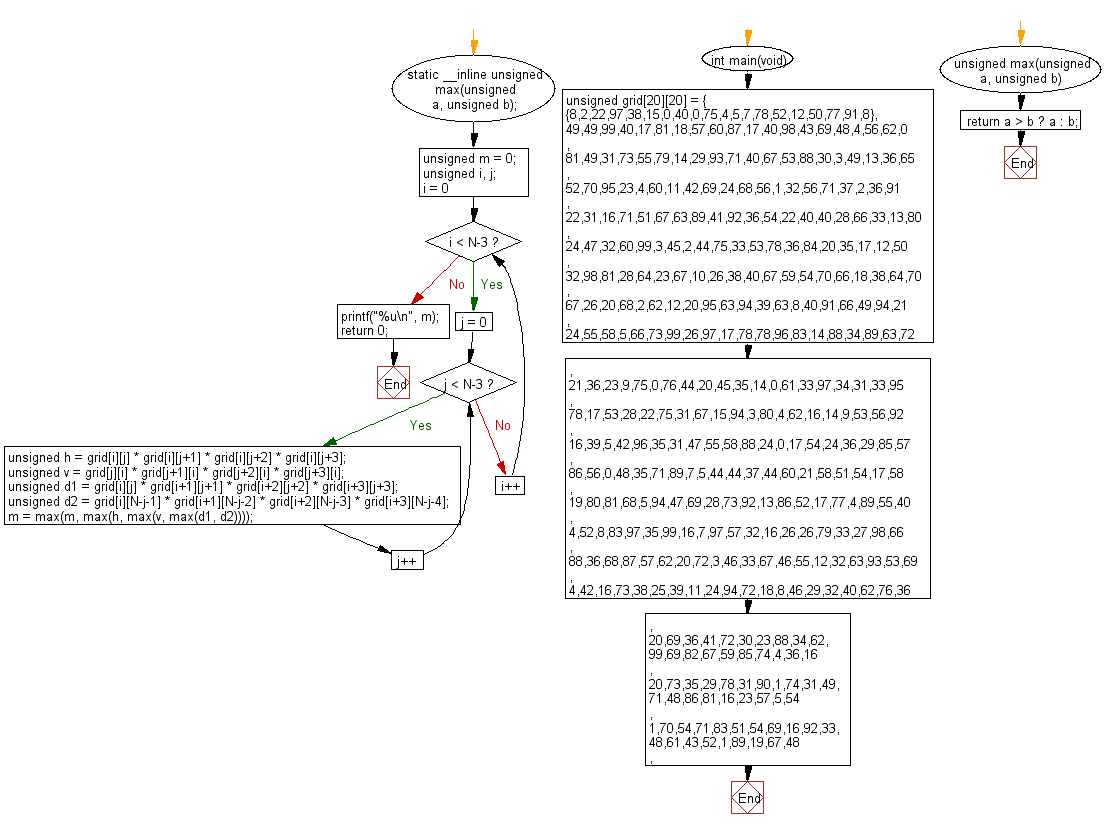C Exercises: Product of four adjacent numbers in a 20x20 grid
27. Ascending Prime Numbers (Strictly Increasing Digits) Variants
In the 20×20 grid below, four numbers along a diagonal line have been marked in red.
08 02 22 97 38 15 00 40 00 75 04 05 07 78 52 12 50 77 91 08
49 49 99 40 17 81 18 57 60 87 17 40 98 43 69 48 04 56 62 00
81 49 31 73 55 79 14 29 93 71 40 67 53 88 30 03 49 13 36 65
52 70 95 23 04 60 11 42 69 24 68 56 01 32 56 71 37 02 36 91
22 31 16 71 51 67 63 89 41 92 36 54 22 40 40 28 66 33 13 80
24 47 32 60 99 03 45 02 44 75 33 53 78 36 84 20 35 17 12 50
32 98 81 28 64 23 67 10 26 38 40 67 59 54 70 66 18 38 64 70
67 26 20 68 02 62 12 20 95 63 94 39 63 08 40 91 66 49 94 21
24 55 58 05 66 73 99 26 97 17 78 78 96 83 14 88 34 89 63 72
21 36 23 09 75 00 76 44 20 45 35 14 00 61 33 97 34 31 33 95
78 17 53 28 22 75 31 67 15 94 03 80 04 62 16 14 09 53 56 92
16 39 05 42 96 35 31 47 55 58 88 24 00 17 54 24 36 29 85 57
86 56 00 48 35 71 89 07 05 44 44 37 44 60 21 58 51 54 17 58
19 80 81 68 05 94 47 69 28 73 92 13 86 52 17 77 04 89 55 40
04 52 08 83 97 35 99 16 07 97 57 32 16 26 26 79 33 27 98 66
88 36 68 87 57 62 20 72 03 46 33 67 46 55 12 32 63 93 53 69
04 42 16 73 38 25 39 11 24 94 72 18 08 46 29 32 40 62 76 36
20 69 36 41 72 30 23 88 34 62 99 69 82 67 59 85 74 04 36 16
20 73 35 29 78 31 90 01 74 31 49 71 48 86 81 16 23 57 05 54
01 70 54 71 83 51 54 69 16 92 33 48 61 43 52 01 89 19 67 48
The product of these numbers is 26 × 63 × 78 × 14 = 1788696.
Write a C program to find the greatest product of four adjacent numbers in the same direction (up, down, left, right, or diagonally) in the 20×20 grid.
C Code:
// (c) 2009, eagletmt MIT License <http://opensource.org/licenses/mit-license.php>
#include <stdio.h>
#define N 20
static __inline unsigned max(unsigned a, unsigned b);
int main(void)
{
unsigned grid[20][20] = {
{8,2,22,97,38,15,0,40,0,75,4,5,7,78,52,12,50,77,91,8},
{49,49,99,40,17,81,18,57,60,87,17,40,98,43,69,48,4,56,62,0},
{81,49,31,73,55,79,14,29,93,71,40,67,53,88,30,3,49,13,36,65},
{52,70,95,23,4,60,11,42,69,24,68,56,1,32,56,71,37,2,36,91},
{22,31,16,71,51,67,63,89,41,92,36,54,22,40,40,28,66,33,13,80},
{24,47,32,60,99,3,45,2,44,75,33,53,78,36,84,20,35,17,12,50},
{32,98,81,28,64,23,67,10,26,38,40,67,59,54,70,66,18,38,64,70},
{67,26,20,68,2,62,12,20,95,63,94,39,63,8,40,91,66,49,94,21},
{24,55,58,5,66,73,99,26,97,17,78,78,96,83,14,88,34,89,63,72},
{21,36,23,9,75,0,76,44,20,45,35,14,0,61,33,97,34,31,33,95},
{78,17,53,28,22,75,31,67,15,94,3,80,4,62,16,14,9,53,56,92},
{16,39,5,42,96,35,31,47,55,58,88,24,0,17,54,24,36,29,85,57},
{86,56,0,48,35,71,89,7,5,44,44,37,44,60,21,58,51,54,17,58},
{19,80,81,68,5,94,47,69,28,73,92,13,86,52,17,77,4,89,55,40},
{4,52,8,83,97,35,99,16,7,97,57,32,16,26,26,79,33,27,98,66},
{88,36,68,87,57,62,20,72,3,46,33,67,46,55,12,32,63,93,53,69},
{4,42,16,73,38,25,39,11,24,94,72,18,8,46,29,32,40,62,76,36},
{20,69,36,41,72,30,23,88,34,62,99,69,82,67,59,85,74,4,36,16},
{20,73,35,29,78,31,90,1,74,31,49,71,48,86,81,16,23,57,5,54},
{1,70,54,71,83,51,54,69,16,92,33,48,61,43,52,1,89,19,67,48},
};
unsigned m = 0;
unsigned i, j;
for (i = 0; i < N-3; i++) {
for (j = 0; j < N-3; j++) {
unsigned h = grid[i][j] * grid[i][j+1] * grid[i][j+2] * grid[i][j+3];
unsigned v = grid[j][i] * grid[j+1][i] * grid[j+2][i] * grid[j+3][i];
unsigned d1 = grid[i][j] * grid[i+1][j+1] * grid[i+2][j+2] * grid[i+3][j+3];
unsigned d2 = grid[i][N-j-1] * grid[i+1][N-j-2] * grid[i+2][N-j-3] * grid[i+3][N-j-4];
m = max(m, max(h, max(v, max(d1, d2))));
}
}
printf("%u\n", m);
return 0;
}
unsigned max(unsigned a, unsigned b)
{
return a > b ? a : b;
}
Sample Output:
70600674
Flowchart:

For more Practice: Solve these Related Problems:
- Write a C program to generate all prime numbers whose digits are in strictly ascending order.
- Write a C program to count the number of primes with ascending digits within a specified range.
- Write a C program to list ascending ordered prime numbers and calculate their total sum.
- Write a C program to output ascending prime numbers and then verify if they form an arithmetic sequence.
Go to:
PREV : Minimum Insertions for Palindrome Variants.
NEXT : Descending Prime Numbers (Strictly Decreasing Digits) Variants.
C Programming Code Editor:
Contribute your code and comments through Disqus.
What is the difficulty level of this exercise?
Test your Programming skills with w3resource's quiz.
